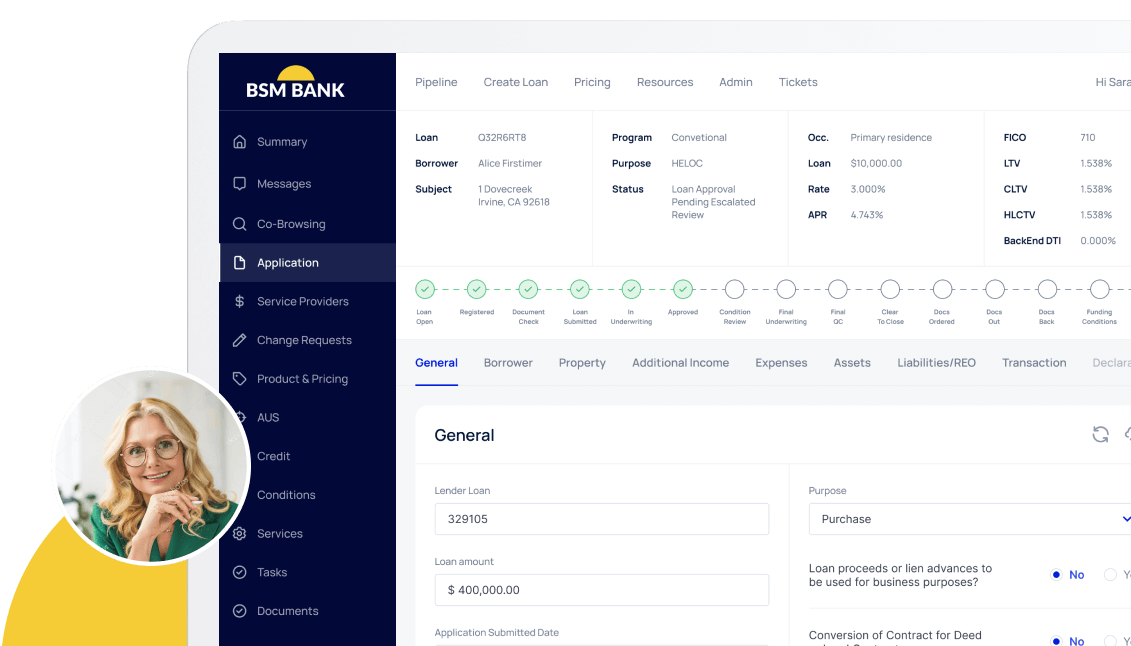Choosing the right person for any role can make all the difference. That’s why selecting a team with the right skills to complete an implementation project is important to ensure you are setting your team up for success and not failure. This is also true when implementing any type of digital mortgage platform, like a point-of-sale (POS) system.
Here’s why:
- A POS does more than just collect data. The right team should understand the loan cycle and your technology workflow, from the initial point-of-sale, all the way to shipping.
- Your team needs to interact with various parties internally and externally, including third parties to complete an implementation, and therefore will need to be agile and skilled to navigate timelines and change management.
- If you want to continue innovating your process, you need to see beyond the front-end solution of your system and actually challenge your team to think how it can go deeper into your loan process.
So, what team should be leading a POS implementation? What should be expected of them? As we mentioned before, all projects need to have an end goal with clear expectations. Depending on the scope of the project for a POS, here is the ideal implementation team.
Project Manager/Implementation Specialist
The project manager or implementation specialist will be responsible for the success of the POS implementation. This person will be the main point of contact for all team members and will own the following key responsibilities.
- Managing the project timeline;
- Defining the project and setting goals;
- Gathering information and allocating resources;
- And, budget planning.
This individual will need to work with all internal and external teams. Internal departments include the IT department, compliance, operations, development and marketing. External teams include your outside vendors. All parties need to fully understand how to proceed once items are considered complete. They will also need to be able to identify risks that could impact the project and/or create delays, and call them out sooner rather than later.
Technical Member(s)
Technical individuals need to be a part of the team to implement the development of the project, such as integrations, configurations, hardware, network and workflows. For example, if there are customizations the technical team can plan the development work in phases. It is crucial that the technical team has a deep knowledge of the ins and outs of their system.
Responsibilities include:
- Executing the technology vision;
- Working with the POS team to address technical issues, such as bugs and data integrity;
- And, breaking down tasks, based on complexity and distributing them to the right people.
If a certain lender is making a lot of changes to their core processes, this person will need to identify the business functions and be able to make technical decisions for this project. This person, along with the POS team, will need to have clear expectations on deliverables and address any developmental roadblocks ahead of time.
Compliance Officer
Compliance officers are important because they will look at the new origination process from a compliance perspective. This person is responsible for reviewing the new way loan applications are processed with a new POS. They should be able to review all the verbiage with the legal team, and be able to approve any new features that deal with regulations.
Marketing Manager
Marketing managers are important, especially if the lender is connecting their POS with a customer relationship management (CRM) platform. However, if a lender outsources their marketing efforts, they can also use their internal sales manager to get input on the new workflow.
Subscribe to BeSmartee 's Digital Mortgage Blog to receive:
- Mortgage Industry Insights
- Security & Compliance Updates
- Q&A's Featuring Mortgage & Technology Experts
One main goal for this individual is to understand how information is collected and received from a POS to the CRM. For example, when a client falls out from the application, what is the next step? Who will need to follow up on leads? All of these questions should be addressed and understood to avoid delays.
Sales Manager
A sales manager needs to understand the software to fully roll the product out to the entire team. They may ask more specific questions such as how credit is run? How does pricing work? For example, a Sales Manager may be able to identify common problems that they may see with their current technology stack that can be fixed during this transition.
Quality Assurance
This individual will ensure that the software is tested before it is launched. They will need to understand the output of every test and every loan scenario possible. This person will be working with the POS partner’s QA team to ensure that the product works as expected. If the POS has been highly configured, then all changes must be tested, including those that deal with regulation. Sometimes clients use processors, underwriters and other members from their team to perform this task.
Trainer
Additionally, you will need to make sure your loan officers understand how to use your new software, so having a trainer dedicated to this part of the process will be necessary. If you’re a bank that hires mortgage bankers or an originator that hires loan officers on a monthly basis, then you need to have someone teaching your new team members how to use the software so they are able to get the most out of it. With today’s new technology, mortgage bankers and loan officers should definitely be increasing their productivity.
Executive Team/Key Stakeholders
The final group involved in the implementation process is the owner or executive team, leading the change. Ultimately, the implementation team will need guidance and oversight to complete the entire project. The last thing you want to do is create a team and then find out ninety days later that everyone is way behind on that project. To avoid surprises, schedule regular check-in meetings and set KPIs to track progress along the way.
What happens when you don’t have the team or the know-how to complete a Mortgage POS implementation?
For lenders that don’t have the resources, but want to implement a POS, it all comes down to the investment on the project. Some clients outsource their POS implementation projects to companies, like BlackFin Group. They help lenders fully launch a successful POS solution. Other lenders choose to start with an out-of-the-box product to get started, and then add features in phases. Again, it all depends on your goals as a lender.
In our experience, the most successful implementations are the ones where all expectations are confirmed from the beginning, before even starting the project. Meaning, everyone on both sides, understands the who, what, when and how. Sometimes, it is not the lack of resources that delays the implementation process, but the lack of understanding of internal processes.
Conclusion
Everything starts from the top down. In order to create change inside an organization one must create a team that works together to collaborate, communicate and provide insight—one that can innovate at the same time. So, which team will lead your next software implementation next? As Michael Jordan once said, “Talent wins games, but teamwork and intelligence win championships.”




